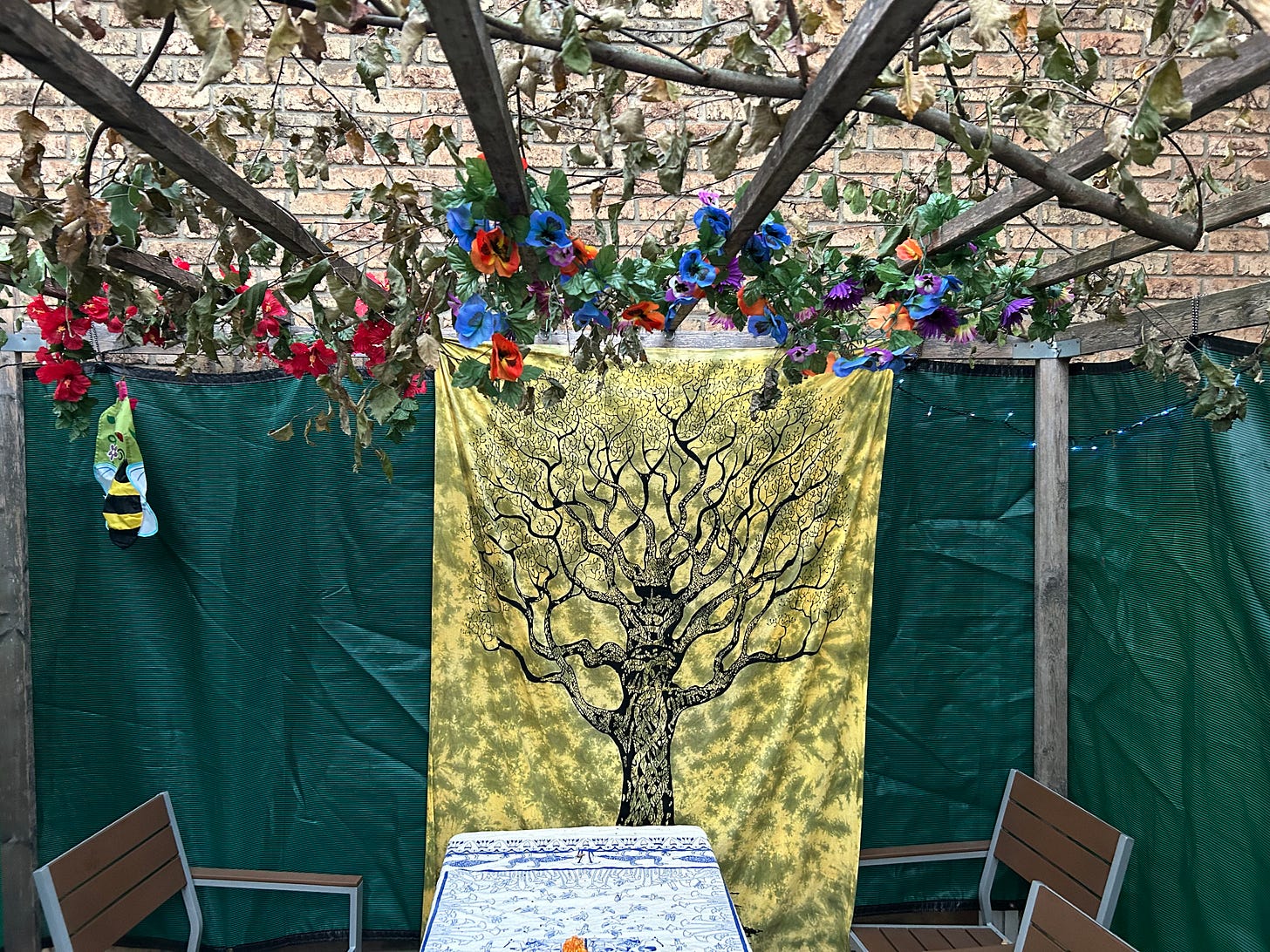עוּלוּ אוּשְׁפִּיזִין עִלָּאִין קַדִּישִׁין, עוּלוּ אֲבָהָן עִלָּאִין קַדִּישִׁין, לְמֵיתַב בְּצִלָּא דִמְהֵימְנוּתָא עִלָּאָה בְּצִלָּא דְּקב"ה.
Ulu, ulu ushpizin ila’in kadishin Ulu, ulu avahan ila'in kadishin l'meitav b'tzila dimheimnuta ila'ah b'tzila d'kud'sha b'rikh hu Come in exalted holy guests Come in beloved holy guests, Come sit in the shade of exalted faith, in the shadow of the Holy One, Blessed be He.
Welcome, guests —Moadim L’Simcha!
This is the week of Sukkot, the seven-day Jewish harvest festival commemorating the Israelites' wandering in the wilderness. After the intensity of the High Holidays, Jews quickly construct a temporary hut in our backyards and eat, sleep, and, and live there as much as possible.
More than just a festival of harvest, it’s a festival of impermanence. The flimsy boards, makeshift decorations, and intentionally unfinished roof remind us of our vulnerability. As the wisdom teacher, Ecclesiastes, wrote: “I observed all the happenings beneath the sun, and I found that all is futile and pursuit of wind.”
This has been a busy week, and I am feeling deeply in the shadow of my looming dissertation deadline (4/1/25) and the morass of festival days which enrich my life but slow my writing. Trying to get out a meaningful message today feels as shaky as a fiddler on a roof — even worse, a fiddler on a sukkah!
But I take comfort from one of the most important traditions of Sukkot — having ushpizin — guests. When structure and permanence feel like they are falling apart, the tradition of having guests in the Sukkah reminds us that human connection is sweet and enduring, and a vulnerable life is also a life in which others can enter under your canopy.
So I would like to take the opportunity this week to allow you, dear readers, to be my guests. I know you to be an eclectic and wonderful mix of people — you should only be so lucky as to know each other as well.
Please introduce yourself in the comments below: Who are you? Where do you hail from? What interests you about Jewish music?
You can say anything — at least anything you would say as a guest in my Sukkah.
Chag sameach!





Thanks, Daniel! I certainly know this tradition from the USA, though it may be more academically taught than handed down. I learned it in school and did an Oscar Julius setting for one of my nusach practica: https://youtu.be/CaSuQ9Ea0OA?si=YEXX_xHONlRIt8Ik
I am Daniel Tunkel, from London UK, though sitting in a Sukkah in Netanya, Israel, as I write this.
Here is a seasonal musical suggestion for you. The Jews of Frankfurt-am-Main had a musical tradition for Simchat Torah that spread a bit, though not as far and wide as one might have thought, given that it is great fun. After Musaf, the cantor (perhaps assisted by a choir) would intone the Jahrkaddisch (Yahrkaddish, if you prefer).
This would in essence be the text of Kaddish Titkabal, but with each section sung to a different melody from some part of the Jewish festival year. All put together for the fun and jollity of the occasion (and, I dare say, to remind folk that the festivals are over now for the winter (well, at least until Hanukkah) and that this is as good a way of underlining this musically as one might).
I seem to recall that there is a very early Yahrkaddish version given in Idelsohn’s volume of 18th century or earlier German Jewish manuscripts. Attributed to one Jekl Singer from Amsterdam (somebody please correct me if I have this wrong). I’m not sure whether any of the nusach books from Frankfurt itself offer this interesting format (again, fire away if you reading this know better). However, much the most elaborate version I am aware of is produced by (ie in the name of) Mombach in Neim Zmiros Yisroeil, which was the posthumous publication of his music from 1881, and not therefore wholly reliable. It is set for cantor and choir, runs to several folio pages, and offers tunes from 7 or 8 festivals (if memory serves).
Mombach came from Pfungstadt, a very small community in central Germany that would have been in Frankfurt’s domain. I’m not aware of whether he visited Frankfurt, though since he came to London at the age of about 13 and stayed his entire life, I think that is relatively unlikely. My supposition is that Mombach created his Yahrkaddish based on the premise of the tradition, rather than conveying an actual Frankfurt composition into English usage.
Although much Mombach is still sung in the UK, this piece has fallen into disuse. Certainly I’m not aware the tradition ever caught on in the UK. Maybe it is time to revive this end-of-season gimmick, even if just for concert performance.